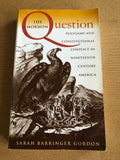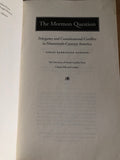The Mormon Question Polygamy And Constitutional Conflict In Nineteenth Century America by: Sarah Barringer Gordon
"The conflict over polygamy became the preoccupation of novelists, journalists, political cartoonists, and newspaper editors, clerics, lecturers, lobbyists, woman's rights activists, political theorists, missionaries, state and national politicians, criminal defendants and their families, constitutional and criminal defense lawyers, federal and territorial officials, presidents, and Supreme Court justices. This book is about their efforts to explain why the practice of polygamy in the Mormon territory (eventually state) of Utah and surrounding jurisdictions created a constitutional conflict over the meaning and scope of liberty and democracy in the United States. Vast quantities of ink and paper were invested in the project, and yield rich rewards. The 'Mormon Question, ' as many nineteenth-century Americans called it, posed fundamental questions about religion, marriage, and constitutional law. The national Constitution must not shield such immorality, those who opposed polygamy (antipolygamists) argued, or liberty would be fatally compromised. There must be a relationship between the structures of government created by the Constitution and the structures of Christian morality that made civilized life possible. The doubt that swirled about the moral nature of the Constitution, however, meant that such claims were always tinged by uncertainty. Real and significant differences about the core of sovereign authority in America propelled defenders of monogamy into untested constitutional theories, as they struggled to articulate how the national government could assume authority over marriage and faith in Utah. Most important, such arguments met with fierce resistance from Mormons"--Introduction, pages 1/4 (illustrations intervening).
Condition: Good




